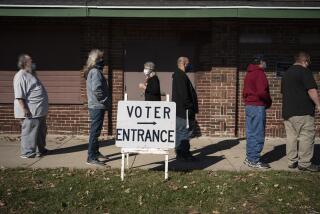Bush Seeks to Restrict Campaign Funds From Unions, Corporations
- Share via
WASHINGTON — President Bush on Thursday renewed a controversial proposal to force unions to obtain permission from members before spending their dues on political activities, but he added a new twist as he laid out his vision for campaign finance reform for the first time since taking office.
The twist is this: Bush would also force corporations to get consent from shareholders before opening their treasuries for politics.
In a letter to Senate Majority Leader Trent Lott (R-Miss.) days before the Senate begins a major debate on reform, Bush did not rule out compromise.
“I remain open to other ideas to meet our shared goals,” Bush wrote.
Although it is unclear how Bush’s proposals--some new, most recycled from his campaign--will affect a complex and still-fluid legislative dynamic, the letter and statement of principles from the White House were notable for what they did not contain.
There was no veto threat against legislation pushed by Sens. John McCain (R-Ariz.) and Russell D. Feingold (D-Wis.) to ban unlimited donations to political parties, known as soft money, and to regulate certain political advertisements sponsored by groups other than candidates and parties.
More than anything, an accommodating tone from Bush at the outset of what could be a fiercely partisan debate on an issue sensitive to the Republican and Democratic parties could enhance the prospects for enactment of major campaign-finance legislation for the first time in a quarter-century. The Senate is scheduled to take up the McCain-Feingold bill on Monday in a debate expected to last two weeks.
For the first time in years, Senate Republican leaders are not moving to block debate on the bill by filibuster--a tacit recognition of the growing number of senators who endorse reform.
In a joint statement, McCain and Feingold said: “We applaud the president for beginning to engage the Congress on the vital issue of campaign finance reform.”
Sen. Larry E. Craig (R-Idaho), a member of the chamber’s GOP leadership, said he believes the president wants to cut a deal. He said Bush’s proposals could be attached to alternative legislation sponsored by Sen. Charles Hagel (R-Neb.). Hagel’s bill would cap, rather than abolish, soft-money donations to national political parties. State parties would be unaffected, a provision critics call a loophole.
Hagel, who has discussed the issue with Bush at least three times in recent weeks, said: “We have a lot of common ground as we begin next week’s debate.”
Among Bush’s principles were these:
* What proponents call “paycheck protection,” restricting the uses of union dues not authorized by members. Democrats say this would be a deal-killer. Bush advocated the measure in last year’s campaign.
* So-called shareholder protection, requiring corporations to obtain consent from shareholders before making political gifts. This is new territory for Bush. Although this idea has circulated on Capitol Hill, critics say it would be highly difficult to craft a workable measure. McCain approves of it in theory but says it is almost impossible to enact.
* A ban on corporate and labor soft-money donations. Bush proposed this during his battle with McCain for the GOP presidential nomination. McCain noted at the time that the proposal omitted soft-money donations from wealthy individuals. On Thursday, referring to a wealthy contributor involved in the Clinton presidential pardon controversy, McCain said: “I have two words in response to the absence of a ban on individual soft-money contributions: Denise Rich.”
* An increase in the amount of money that individuals can donate directly to federal candidates, known as hard money. This idea has bipartisan support from many lawmakers who complain that they are forced to raise money in 21st century campaigns with limits stuck at Watergate-era levels. But critics say raising the limits could undo a key goal of reform: reducing or limiting the total amount of money in politics.
Bush also said that reforms in general should strengthen parties rather than weaken them. He proposed that the final bill should be written in such a way that it would be voided if the courts found any part of it unconstitutional--a critical provision that McCain and Feingold oppose.
Elaborating on his principles in brief remarks to reporters at the White House, Bush said: “I think we ought to get rid of labor union and corporate soft money. And I know we need to . . . make sure that shareholders and labor union members have got a say-so on how their money is spent.”
Word of Bush’s statement was still filtering through the Senate Thursday.
Sen. Evan Bayh (D-Ind.), told of the highlights, said he believes the White House wants a campaign finance bill--but only on its own terms. “Will [Bush] sign one if it’s not on his terms? My guess is, probably not.”
Critics of the McCain-Feingold measure took heart from Bush’s statement.
“President Bush has appropriately called for fair, balanced and constitutional reform,” said Sen. Mitch McConnell (R-Ky.), a leading critic of the two senators’ bill. “Obviously, McCain-Feingold fails this test miserably. McCain-Feingold fails to update hard-money limits for inflation, fails to include paycheck protection, fails to strengthen our political parties.”
*
Times staff writer Edwin Chen contributed to this story.
More to Read
Get the L.A. Times Politics newsletter
Deeply reported insights into legislation, politics and policy from Sacramento, Washington and beyond. In your inbox twice per week.
You may occasionally receive promotional content from the Los Angeles Times.










